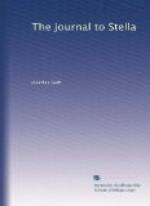24 Thomas Parnell, the poet, married, in 1706, Anne, daughter of Thomas Minchin, of Tipperary. In 1711 Parnell was thirty-two years of age, and was Archdeacon of Clogher and Vicar of Clontibret. Swift took much trouble to obtain for Parnell the friendship of Bolingbroke and other persons of note, and Parnell became a member of the Scriblerus Club. In 1716 he was made Vicar of Finglas, and after his death in 1718 Pope prepared an edition of his poems. The fits of depression to which Parnell was liable became more marked after his wife’s death, and he seems to have to some extent given way to drink. His sincerity and charm of manner made him welcome with men of both parties.
25 Dr. Henry Compton had been Bishop of London since 1675. He was dangerously ill early in 1711, but he lived until 1713, when he was eighty-one.
26 See Letter 26, note 10.
27 See Letter 7, note 21.
28 L’Estrange speaks of “a whiffling fop” and Swift says, “Every whiffler in a laced coat, who frequents the chocolate-house, shall talk of the Constitution.”
29 Prior’s first visit to France with a view to the secret negotiations with that country which the Ministers were now bent on carrying through, had been made in July, when he and Gaultier reached Calais in a fishing-boat and proceeded to Fontainbleau under assumed names. He returned to England in August, but was recognised at Dover, whence the news spread all over London, to the great annoyance of the Ministers. The officer who recognised Prior was John Macky, reputed author of those Characters upon which Swift wrote comments. Formerly a secret service agent under William iii., Macky had been given the direction of the Ostend mail packets by Marlborough, to whom he communicated the news of Prior’s journey. Bolingbroke threatened to hang Macky, and he was thrown into prison; but the accession of George I. again brought him favour and employment.
30 See Letter 12, note 7.
Letter 29.
1 See Letter 3, note 4.
2 See Letter 6, note 4.
3 Edward Villiers (1656-1711), created Viscount Villiers in 1691, was made Earl of Jersey in 1697. Under William iii. he was Lord Chamberlain and Secretary of State, but he was dismissed from office in 1704. When he died he had been nominated as a plenipotentiary at the Congress of Utrecht, and was about to receive the appointment of Lord Privy Seal. Lord Jersey married, in 1681, when she was eighteen, Barbara, daughter of William Chiffinch, closet-keeper to Charles ii.; she died in 1735.
4 Lord Paisley was the Earl of Abercorn’s eldest surviving son (see Letter 17, note 7).
5 The Hon. John Hamilton, the Earl’s second surviving son, died in 1714.
6 Dr. John Robinson (1650-1723) had gone out as chaplain to the Embassy at the Court of Sweden in 1682, and had returned in 1708 with the double reputation of being a thorough Churchman and a sound diplomatist. He was soon made Dean of Windsor, and afterwards Bishop of Bristol. He was now introduced to the Council Board, and it was made known to those in the confidence of Ministers that he would be one of the English plenipotentiaries at the coming Peace Congress. In 1713 Dr. Robinson was made Bishop of London.




